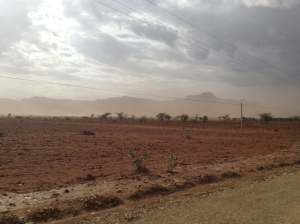The Making of Backroad Carnival, chapter 6: Pigeon Man
September 11, 2017
I used to live in the 19th arrondissement of Paris, overlooking the Bassin de la Villette, a neighborhood replete with cultural barges, movie theaters, breweries and more. When the weather is nice, huge crowds of people come hang on the canal to play boules and myriad other games, have jam sessions, et “pour prendre l’apéro”. But when the winter gloom sets in, the bobos vanish, and only a small, stalwart group of “boulistes” can be found along with your occasional jogger and dog-walker. And one other curious individual.
I would spend a lot of time rehearsing or giving lessons at home during the week, particularly in the wintertime. Frequently I would stare out my windows at the dreamy landscape – the wind blowing through the rows of poplar trees lined up along the water that would sometimes ice over when it got extra cold. Seagulls, pigeons, and flâneurs in movement, all eerily in sync. I soon began to notice a strange daily ritual.
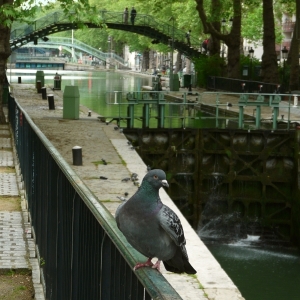 Every day at 2pm, rain or shine, a middle aged, grey-haired, pallid man with a hurried gait and an intense expression on his bearded face would appear with a bag of bread crumbs. Without fault, a massive group of excited, wing-flapping pigeons would gather around him. He proceeded to dump the crumbs methodically, aligning the pigeons almost one by one along the canal. When seagulls tried to peck their way in, pigeon man would shoo them away as if it to say, “No crumbs for you! Only for the pigeons!”
Every day at 2pm, rain or shine, a middle aged, grey-haired, pallid man with a hurried gait and an intense expression on his bearded face would appear with a bag of bread crumbs. Without fault, a massive group of excited, wing-flapping pigeons would gather around him. He proceeded to dump the crumbs methodically, aligning the pigeons almost one by one along the canal. When seagulls tried to peck their way in, pigeon man would shoo them away as if it to say, “No crumbs for you! Only for the pigeons!”
Occasionally while on an afternoon walk or jog I’d even see it happen right in front of me. While on one of these jogs during which I was listening to the podcast Radiolab, a story came up about pigeons, how they have an amazing GPS system hardwired into their bodies, how they tap into the earth’s magnetic fields to guide themselves, and other aspects of their intelligence.
This put a whole new spin on my pigeon man, and I wrote these lyrics:
Everyday rain or shine
He puts them pigeons in a line
Everyday rain or shine
Feeding them pigeons just to keep from crying
Chasing down death, chasing down death
Chasing down death with a bag of crumbs
With a bag of crumbs
Feeding them birds right in front of the bums
The avian congregation gathers so patiently
Gathers patiently
For the pallid man to appear between the trees
Don’t count your pigeons ‘fore their hatched
Just put your pigeons in a batch
Don’t count your pigeons ‘fore their hatched
Just put your pigeons in a batch
Might be their magnetism, their ingrained socialism
Don’t count your pigeons before their hatched
Might be their mating coos, or to fatten the squabs for food
Don’t count your pigeons ‘fore their hatched
Just put your pigeons in a batch
Seagulls, seagulls, don’t try to make that afternoon creep
Don’t try to make that creep
Pigeon man will shoo you off with his feet
Some say he’s crazy, some say he’s slow
Some say he’s some sort of god of old
Some sort of god of old
He’ll still be out there when hell freezes over
Don’t count your pigeons ‘fore their hatched
Just put your pigeons in a batch
Don’t count your pigeons ‘fore their hatched
Just put your pigeons in a batch
Might be their magnetism, their ingrained socialism
Don’t count your pigeons before their hatched
Might be their mating coos, or to fatten the squabs for food
Don’t count your pigeons ‘fore their hatched
Just put your pigeons in a batch
It probably took a few different attempts before I found a match with some musical ideas I had a-brewing. I think I opted for a sort of a comical blues approach to highlight the comedy in all this. Process-wise, we went for resonator slide guitar married with a vintage electric fed through a nice tube amp, electric bass, dirty harmonica, drums played on a 70s era Ludwig, all recorded on an analog Studer tape machine. For that extra sheen, I got my Addis Ababa-based friend Kenny Allen to lay some golden background vocals. And there you have it!
As one might expect, I was listening to a lot of Congolese music when I came up with the intro riff of this tune. It then sat around in my mind for a while before I conjoined it with a few other musical ideas. It’s sort of soukous, pop, and blues all wrapped into one tune.
The “tattered flag” image had been hovering around the edges of my mind since a trip up the Niger to Timbuktu in Mali in 2010. If  I remember correctly the pinasse (boat) we were on was flying this striped, tattered flag that represented I know not what. This sad and tired harbinger just kept staring down as we crept up the river heading to the desert. The trip changed me. Little kids fighting over an empty bottle of water we had given them so they could fill water from the river all the way to the top using the bottle cap, racing back to bring it to their mother so she could use it to cook and clean. Stuck in a river village during a sandstorm in the home of a charlatan griot asking us for money before he imparted his “knowledge”. Hippos sniffing our tent. Children in a Bozo fishing village surrounding us asking for “bonbons cadeaux” (candy gifts). Niafunké, meeting Ali Farka Toure’s son. And finally the somewhat anti-climactic arrival in Timbuktu.
I remember correctly the pinasse (boat) we were on was flying this striped, tattered flag that represented I know not what. This sad and tired harbinger just kept staring down as we crept up the river heading to the desert. The trip changed me. Little kids fighting over an empty bottle of water we had given them so they could fill water from the river all the way to the top using the bottle cap, racing back to bring it to their mother so she could use it to cook and clean. Stuck in a river village during a sandstorm in the home of a charlatan griot asking us for money before he imparted his “knowledge”. Hippos sniffing our tent. Children in a Bozo fishing village surrounding us asking for “bonbons cadeaux” (candy gifts). Niafunké, meeting Ali Farka Toure’s son. And finally the somewhat anti-climactic arrival in Timbuktu.
Lyrically this tune was also influenced by my time in Ethiopia (references to the working women in the streets of Addis, of which there are thousands on any given night), and the general political malaise in the western world!
Lyrics:
Money man don’t you eat my lunch
You’ve already wolfed down more than enough
We’re nibbling on the crumbs that you leave
And now you want our scraps in case you get hungry
Oooh hunger tears us asunder, greed sows the seed of need
Working woman what you standing there for?
You really sure you wanna open that fancy car’s door?
They’ll take you between half-built buildings with wooden scaffolds
Do what you gotta to but don’t do everything you’re told x3
Oooh desire lights the funeral pyres, greed sows the seed of need
Government stooge think twice about who you muzzle
Don’t you realize you’re just a small part of the big puzzle?
A kaleidoscope of revolving doors
Smokescreens, spells, tricks to hide your spoor
Power makes you skulk in tall towers, greed sows the seed of need
Media hack quit nattering on
Your mumbo jumbo hides your real intentions
Fourth and fifth estates blurring into one
You’re spinning stories and selling other’s potions
Privatize mask the pirates’ eyes greed sows the seed of need
Lower that tattered flag…
I recorded the guitars, bass and vocals at Tonehouse studio. Renaud plays calabash, drums, and light percussion, my brother Yann laid a little Juno synth as did Jean-Etienne Loose, who along with Geoffroy Dauptain and myself added the claps.
Hodgepodge
This tune is a good example of what happens when a bunch of ideas get mixed up in a bubbling cauldron and put on low heat for a year or three. I’m pretty sure I started hashing out the clawhammer banjo part based on various old-time motifs. It’s in Cumberland Gap tuning (fDGCD, capo 6 with 5 string raised to a B), one of my favorite banjo tunings (the Seznec Bros tune Red Road is in that tuning as is 21st Century Traveling Man off my first record). It takes a little harmonic side road at various points, and rhythmically the whole thing gets turned on its head with the bass and percussion emphasizing the offbeats. This combination of calabash and offbeats provides a more pulsating African feel to a tune that otherwise might have been a more middle-of-the-road ballad. In the studio we opted for a Juno analog synth to give it a more ethereal, pop dimension than a standard piano or organ sound. And lastly my friend Paolo Conti came in to lay some haunting pedal steel. So what is this? Who knows, but for me it really underscores how the banjo and the calabash can be really good friends.
Lyrics
The lyrics are simple and began when I was driving down a dirt road in Ethiopia, watching a young girl who was watching me. As I’m not one for poring over my lyrics in great detail, I’ll leave it up to you to interpret all this as you wish…
Watching you watching me, watching you watching me
Trying hard to see, trying hard to see
Ain’t no writing on the wall if you don’t know how to read
Ain’t no need for notes at all, just play the damn thing
Ain’t no need for history if it keeps repeating
Hawk on a haystack, prisoner of hope
Seeking its prize on the golden slope
But Ain’t no spoils for the victor in a land of barren dirt
Ain’t no aces tucked up your sleeve, if you ain’t got a shirt
Can’t keep your ears to the ground, if there’s nothing you haven’t heard
Watching you watching me watching you watching me… Hawk on a, hawk on a haystack…
Recording Process
As with Sell You My Soul, we recorded this live on a Studer A80 tape recorder at Tonehouse Studio with the idea of nailing the rhythm section (bass, percussion and harmonica). We then went back and redid the banjo to get a nice sound, and overdubbed rhythm guitar, shaker, synth (played by my brother Yann), pedal steel (by Paolo Conti), and of course vocals.
Video
Here is a live video of Hawk recorded in March 2016 at the Péniche Anako in Paris (the sound isn’t amazing, but you get the gist):
Inspiration
In May 2014, I went on an epic field recording trip through the heartland of Ethiopia with a team of non-academics led by Quino Piñero and Jonathan Banes. The goal was to get 1) lots of footage for the beautiful film Roaring Abyss directed by Quino, and 2) high quality audio for a groovy compilation released by Jonathan called Out of Addis. Needless to say, many strange, beautiful and horrifying things happened on this trip, which you can read about in depth if you scroll down this blog a bit. There was one very specific moment in all this that triggered the beginning of my song “Sell You My Soul”: I was in a storage godjo (hut) setting up microphones and gear to prepare the terrain for a recording session in the remote northern mountains of the Wollo region when a a young dude began pressing me to buy one of his two sisters (who couldn’t have been more than 11 and 14 years old). They were behind his back looking at me shaking their heads, silently imploring me not to buy them. At first I thought this was a joke, but it kept going for 10 minutes or so and became quite disturbing. He made perverted hand gestures, saying the girls would be really “good” in a couple of years. He finally got the message that I wasn’t interested and moved on. You can read all about that exceedingly bizarre day here.
I think this little moment represented the breaking of the levees in my mind about what mankind appeared prepared to do to get ahead. I had been in Africa for a full year by this point, and I suppose that that experience just unraveled all my head-in-the-sand naiveté and willful ignorance that I had keenly tried to preserve up until then. There had been some other experiences: a road trip to Wenchi crater a few hours outside Addis that went completely awry, with young, agressive, unemployed men desperate to fleece us for every last birr the minute they saw we were broken down and desperate; people (including some we had met) being callously tossed in prison for voicing even mild forms of dissent or for being (falsely) accused of wrongdoing; the witnessing of rampant prostitution, which had apparently skyrocketed over the previous several years; etc etc.
But in the end, this was merely the African piece of the horror puzzle. The song is more of a general overview of soul-vending (see lyrics below). I think I have been starting to become very uneasy in this modern world with the idea of putting all aspects of my self out there. So, while of course I was shocked at this guy trying to sell me his sister, it became a giant metaphor for what we are all doing – putting all aspects of our public and private lives on “sale” to get more attention, more likes, more success, and, in the end, more money. This is all the more daunting when your work involves having a strong online presence, as it seems increasingly expected that you share everything. Ok, so politicians, media “personalities”, actors, models all do this, so why not musicians? But it does makes me particularly sad to see artists broadcasting to the public at large their latest offspring, their partners, and other sordid details of their personal lives (including “leaked” sex tapes). It’s probably a classic case of sink-or-swim, and that my luddite self should just jump on the bandwagon of social media-induced oversharing, but sending this information out to people I don’t know makes my stomach turn. How can one really have a private life if even that is given away to the public? I know that google, apple, facebook, uber and others already have all this info in their databases, but does that mean everyone else also gets to have it?
We all know that babies, pets, rumors/gossip, fake news, and leaked private footage will get you exponentially more attention than anything else you do. So is the calculation that by making the private public and thereby constructing a virtual sense of “community” around you, the public will buy you in all your commodified incarnations? Whoopdidoo. I refuse to do this and so I’ll never “make it”. I don’t really care either, but the further we head into the future, the more I want to head into the woods. For now though I’ll swim, but hopefully more on my own terms.
Clip
With my friend, filmmaker Israel Seoane, and the additional help of cameraman Yoni Robbins, we hastily made a music video here in Paris featuring the actor Florent Dorin as a sort of Mephistopheles producer guy who buys the souls of each musician and molds the band to his liking. The irony of course being that we sold our souls and yet are singing this song to an empty concert hall..
The film was shot in multiple locations around Paris, with the main last scene at the New Morning, a premier venue in north-central Paris (thanks to Tom Woods for hooking that up!).
Lyrics
Sell you my soul for a bottle of homemade gin
Sell you my sister with a toothless craven grin
Sell you my future if right now it guarantees I win
I’ve deflated my ego, auctioned off my psyche
There’s a blowout discount on all that is me
Sell you my wife at the drop of a Stetson hat
Sell you my iddy biddy little kid for my chance at bat
Sell you the shirt off my best bud’s back
Used to say there are some things money can’t buy
Doesn’t mean that I can’t give it my very best try
Sell you my socks to get a pair of shiny gator skin shoes
Sell you my body and pretend I don’t approve
Used to sell the uptown jazz and now I sell the lowdown blues
I’ll give you my troubles, my sins, my weakness for free
And you’ll come buying everything else off me
Sell you my soul.
The recording process
I sent a demo of this to Jean-Etienne and Geoffroy at Tonehouse Studio and they immediately thought “analog”. So after touring and performing the song a bit with the band, we piled into the studio and recorded a few takes live on to a Studer tape machine. I’m on guitar/vocals, Ben Body plays upright bass, David Chalumeau is on harmonica, Patrick Gigon is on drums, Daniel Mizrahi is on lead guitar. We then picked the best version and went back and re-recorded the guitars, the vocals, and the harmonica to get the sounds we wanted. Later my brother overdubbed Rhodes keys, and members of the Gospel Travelers in Annapolis, Maryland recorded some gritty backing vocals at the end.
Picayune Baliverne. The title comes from two words I like a lot that could roughly translate as “Insignificant Nonsense”. I thought this was an amusing way to kick things off.
Here are the actual definitions.
Picayune: 1. adjective informal petty; worthless. 2. noun a small coin of little value, especially a 5-cent piece. 3. informal an insignificant person or thing. ORIGIN
early 19th century: from French picaillon, denoting a Piedmontese copper coin, also used to mean ‘cash,’ from Provençal picaioun, of unknown ultimate origin.
Baliverne: 1.− Fam. (gén. au plur.). Propos ou écrits futiles et souvent erronés. 2. Idées, croyances, coutumes, institutions, etc., sans grand fondement ou considérées comme telles. 3. Plus rarement. Action, comportement, occupation puérils ou stupides et sans grand intérêt.ÉTYMOL. ET HIST. − 1464 (Maistre Pierre Pathelin, éd. Richard T. Holbrook, 810 : Hé! quelz bailleurs de balivernes sont ce cy?). Orig. obsc.; peut-être déverbal de baliverner*, malgré un écart chronol. (Guir. Étymol., p. 13). Le rapprochement avec le prov. mod. baiuverno « étincelle », proposé par Schuchardt dans Z. rom. Philol., t. 28, p. 144, est peu vraisemblable, ce mot paraissant d’autre part récent et lui-même d’étymol. obsc. (v. REW3, 3226).
The title could be construed as a melding of Oscar Wilde’s “all art is useless” theme and Jonathan Franzen’s Richard Katz character who talks about how writing songs is like being in the “chiclet-manufacturing business“. But read into it how you like – there are no lyrics, and the song lasts less than 2 minutes. Perhaps I just liked the way the words roll off the tongue 🙂
The music was spawned while working on a bunch of instrumental music for Fabrice Macaux’s documentary on the UN bombing in Iraq in 2003, La Diplomatie du silence. A comical junkyard western ditty in 5/4 that channels Ennio Morricone and Tom Waits, it clearly was the odd man out vis-à-vis the rest of the music for the documentary. So I plucked it from that context and thrust it at the top of Backroad Carnival as a little introductory piece to set the scene for the oncoming madness.
It all flowed out of me fairly quickly – I recorded the guitars, bass, piano and banjo all in my little glasshouse studio in Addis Ababa last year over the course of a day. We then gave it a treatment at Tonehouse Studio, adding some dirty percussion/drums and shouts, and perfecting the mix before it made the cut and joined the rest of the Backroad Carnival team.
The Making of Backroad Carnival, Chapter 1: The Artwork
June 12, 2017
 The next series of posts will dig into my new album, Backroad Carnival. I’m going to roll up my sleeves and get into the nitty gritty to a) explain how the musical ideas took shape, b) unpack some of the themes raised in the lyrics, c) recount some of the stories/anecdotes that spawned some of the tunes, d) describe the recording/technical process, and e) discuss the choice of artwork.
The next series of posts will dig into my new album, Backroad Carnival. I’m going to roll up my sleeves and get into the nitty gritty to a) explain how the musical ideas took shape, b) unpack some of the themes raised in the lyrics, c) recount some of the stories/anecdotes that spawned some of the tunes, d) describe the recording/technical process, and e) discuss the choice of artwork.
I’ll begin things with the artwork:
I first met photographer and graphic designer Philipp Schütz in Addis Ababa during a concert I did with my friend Kaëthe Hostetter. We performed during a fundraising event for Philipp’s photobook on the Simien Mountains and to draw awareness to the recently completed Limalimo Lodge, perched on the edge of the Simien escarpment. Impressed by Philipp’s amazing photography, he seemed like the perfect candidate to take pictures of me for my new album.
We settled on the old, defunct doors of the Wafa Theatre located at the Churchill roundabout on the southern edge of the Piazza neighborhood of Addis. You could walk right by and nearly miss them. But given the theatrical nature of the album, it was an obvious choice – rusted out doors, wooden “curtains”, a krar shooting off in one direction, people dancing on a bass clef in another, and at the center of it all the ancient sock and buskin masks, symbols of comedy and tragedy: .
Motivated as we were to get the “perfect” image, we did two very early morning photoshoots in order to avoid the crowds and too much attention to the weird ferenjis and their camera equipment. We paid off the guard of the theater (which is still in use, the main entrance is now on the side) to keep an eye on my car and to ward off a lot of the street kids who, while totally unthreatening, might have been a little too interested in the camera equipment!
Philipp took a lot of pictures, and in the end we opted for the above image. There were some other priceless images though, including this one of me with the street kids.
Unfortunately, Philipp had a hard drive failure and lost a bunch of other cool images before getting the chance to back it up. Perhaps we should count ourselves lucky that a good portion of the photos were salvaged, that no one stole anything off of us during the shoot, and most importantly that the authorities didn’t show up to give us a hard time (another benefit of waking up early).
Damakase, Ethiopian groove
March 6, 2017
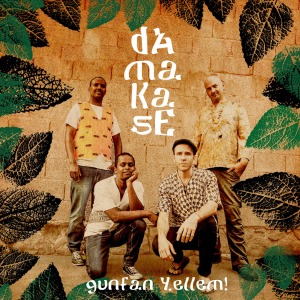 Having terribly neglected this blog for a while, I’m back. This hereby marks the end of my Ethiopia-based posts (of which there have been far too few due to poor internet in country and life getting in the way!). As a last, bittersweet nod to my former life in Addis, here are a few clips featuring the most recent Ethiopian project I’ve been grateful to be a part of, Damakasé. I’m doing my best to get this band going in Europe, North America and elsewhere!
Having terribly neglected this blog for a while, I’m back. This hereby marks the end of my Ethiopia-based posts (of which there have been far too few due to poor internet in country and life getting in the way!). As a last, bittersweet nod to my former life in Addis, here are a few clips featuring the most recent Ethiopian project I’ve been grateful to be a part of, Damakasé. I’m doing my best to get this band going in Europe, North America and elsewhere!
RIP Ethiopian Box Guitarist Mesfin Abebe
June 15, 2016
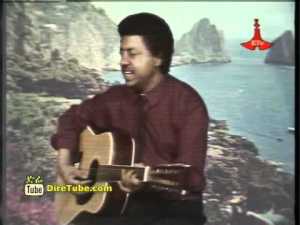 The death of the great Ethiopian box (acoustic) guitarist/singer Mesfin Abebe spurred me to revive this blog. A couple of years ago I had developed a project to interview and record Mesfin (and other box guitarists) that never saw the light due to personal and professional reasons. Now it will unfortunately never see the light, so instead here are a few video clips of the great musician.
The death of the great Ethiopian box (acoustic) guitarist/singer Mesfin Abebe spurred me to revive this blog. A couple of years ago I had developed a project to interview and record Mesfin (and other box guitarists) that never saw the light due to personal and professional reasons. Now it will unfortunately never see the light, so instead here are a few video clips of the great musician.
I believe Mesfin was an Amhara christian who spent a lot of time in the predominantly muslim city of Harar and originally learned the oud before picking up the guitar. His idiosyncratic guitar style featured tricky attacks of single-note pentatonic lines that sound very much like an oud player playing guitar. A bass player mimicking the guitar an octave lower frequently accompanied him in tasteful synchronicity. Mesfin’s high pitched voice provided a beautiful lilting counterpoint to the driving music.
I’m kicking myself for not having made time to interview Mesfin before he passed. I guess I can still try and meet with Abitew Kebede, the Oromo singer/guitarist turned evangelical preacher in Silver Spring, Maryland, if he is willing to talk about the old days (not a guarantee!).
One of my favorites, which I have tried to learn (not easy considering my dismal Amharic):
Mesfin incorporated elements of the blues in to his music. Check out this minor pentatonic instrumental jam:
And these killer, driving, desert blues-like tunes:
If any of you out there want more, I can send you mp3s of his great music, and if you speak Amharic, here’s a special report on his life:
http://www.diretube.com/special-report-about-ethiopian-box-guitarist-mesfin-abebe_3bd386383.html
Field Recording Trip in the Ethio-hinterlands: Day 10 of 10
January 20, 2015
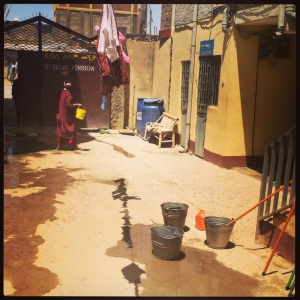 Ouch. Due to other projects and general negligence on my end, it’s taken me over 2 months to tackle the final episode in this mini-series. Let’s hope things improve from here.
Ouch. Due to other projects and general negligence on my end, it’s taken me over 2 months to tackle the final episode in this mini-series. Let’s hope things improve from here.
May 20, 2014
Unbeknownst to me, this was to be my final full day on the recording trip. I hadn’t yet booked my return ticket as I needed to get to an Ethiopian Airlines ticket office. I would end up doing this the next day, purchasing the last available ticket on the night flight back to Addis.
We woke up in our pension in Abi Abdi, packed up and aimed our sights on Mekele, the biggest city in Tigray, but not before stopping for a drink at a little park containing a beautiful enclosed garden full of lush, dense vegetation, a little pond and a waterfall. Little did we know that this would be the serene moment necessary to prepare us for what was to come.
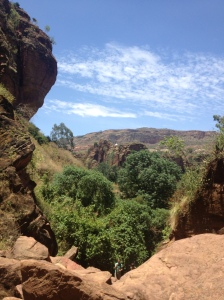
We had barely started climbing up the main road to Mekele before it became quickly apparent that we would be in for a wait. Three giant tow trucks were attempting to extract a Chinese dump truck that had fallen into the ravine. Since this was the only direct road to Mekele, we decided to wait it out and watch it all unfurl. Due to a lethal combination of bad machinery, a bit of incompetence here and there, and generally difficult conditions, this whole procedure 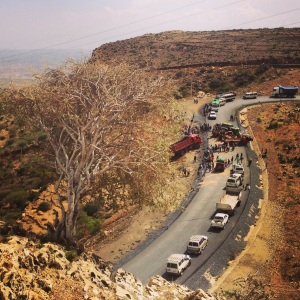 lasted about an hour and a half. Nuhamin and I had time to go for a hike up the mountain to get a good glimpse of both the attempted clean-up and the stunning views of the Tigray countryside.
lasted about an hour and a half. Nuhamin and I had time to go for a hike up the mountain to get a good glimpse of both the attempted clean-up and the stunning views of the Tigray countryside.
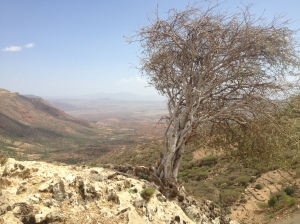
The workers were finally able to get the truck stabilized on the side of the road, allowing us to get a move on. As we got within about an hour of Mekele, we arrived in an unassuming town called Hagere Selam where a quick roadside inquiry led to some rapid-fire negotiation and a recording at the bahal derash with 20-odd young energetic Tigrayans. As we set up in a round cement godjo it began to rain, creating a mucky but atmospheric vibe.
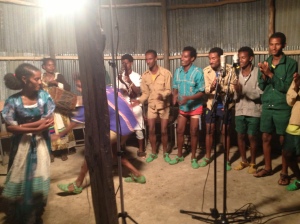 About an hour later, just as it was getting dark, the dancers and musicians showed up in full regalia and put on a vibrant performance. It truly was a fantastic way to conclude the musical portion of my trip.
About an hour later, just as it was getting dark, the dancers and musicians showed up in full regalia and put on a vibrant performance. It truly was a fantastic way to conclude the musical portion of my trip.
After breakdown, we drove a slightly hair-raising 1.5 hrs through the mountains to Mekele and crashed at Dallas Hotel in the skeevy bus station district.
The next day consisted of me getting my plane ticket, going with the guys to the local university to see about recording musicians there, and then heading to the airport, tired but exhilarated from 10 days of madness. What a journey!
Field Recording Trip in the Ethio-hinterlands: Day 9 of 10
November 7, 2014
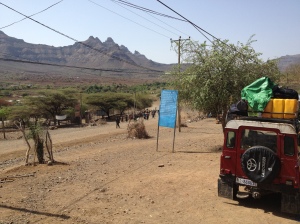 Exhausted from the previous day’s work, we lazily drank coffee and ate inqulal firfir before packing the vehicle and driving to Sekota to try and find Quino’s phone, which he had forgotten at the ful place. Perhaps due to the generally languid state of the group, the drive back was even more nerve-racking than the first leg. We clearly hadn’t tied things down as well as we should have, as my backup went flying at one point. Fortunately, it didn’t go over the cliff. We, however, had a very close call about an hour later as we climbed up the mountain to get back to Sekota. Mesmerized by a stunning view, Jonathan almost didn’t take the turn (one of the tires started to dip into the ravine). After we all screamed, he quickly steered away from the abyss back onto safe purchase. For the next hour or so we were all white-knuckled and on edge.
Exhausted from the previous day’s work, we lazily drank coffee and ate inqulal firfir before packing the vehicle and driving to Sekota to try and find Quino’s phone, which he had forgotten at the ful place. Perhaps due to the generally languid state of the group, the drive back was even more nerve-racking than the first leg. We clearly hadn’t tied things down as well as we should have, as my backup went flying at one point. Fortunately, it didn’t go over the cliff. We, however, had a very close call about an hour later as we climbed up the mountain to get back to Sekota. Mesmerized by a stunning view, Jonathan almost didn’t take the turn (one of the tires started to dip into the ravine). After we all screamed, he quickly steered away from the abyss back onto safe purchase. For the next hour or so we were all white-knuckled and on edge.
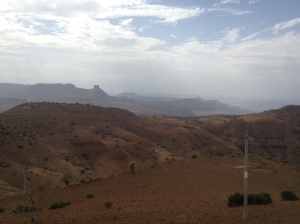 Nevertheless, we made it back to Sekota, had a ful, found Quino’s phone, and managed to cool our jets. We then continued up the road, aiming for Mekele, Tigray. The journey was jaw-droppingly beautiful. Staggeringly huge red cliffs, long plateaus and deep valleys that resemble the
Nevertheless, we made it back to Sekota, had a ful, found Quino’s phone, and managed to cool our jets. We then continued up the road, aiming for Mekele, Tigray. The journey was jaw-droppingly beautiful. Staggeringly huge red cliffs, long plateaus and deep valleys that resemble the 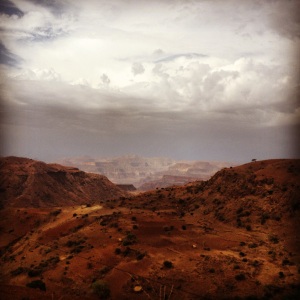 Arizona mesas gave way to massive expanses of crimson desert, with cactus, giant fig and baobab trees
Arizona mesas gave way to massive expanses of crimson desert, with cactus, giant fig and baobab trees 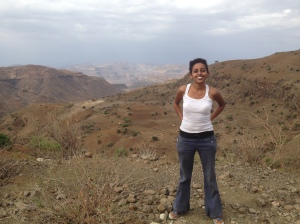 emblazoning the rugged landscape. At one point, a windstorm swept across the valley we were driving through, kicking up immense billows of red sand. In the background, dark, ominous storm clouds sent paroxysms of violent slanted rain in our direction. Yet as quickly as it came, it disappeared again.
emblazoning the rugged landscape. At one point, a windstorm swept across the valley we were driving through, kicking up immense billows of red sand. In the background, dark, ominous storm clouds sent paroxysms of violent slanted rain in our direction. Yet as quickly as it came, it disappeared again.
Around early evening we landed in the newly developed town of Abi Abdi, where we decided to hole up in a little pension outside of town, have a meal nearby check out the local music scene (which turned out to be pretty much non-existent). A modern, predominantly muslim quarry town, it is clearly flourishing thanks to the construction boom in the country. We ended the night with a beer in some dimly lit bar with deafening ethiopop blasting out of gigantic speakers, and ambled back to the pension to hit the hay.

